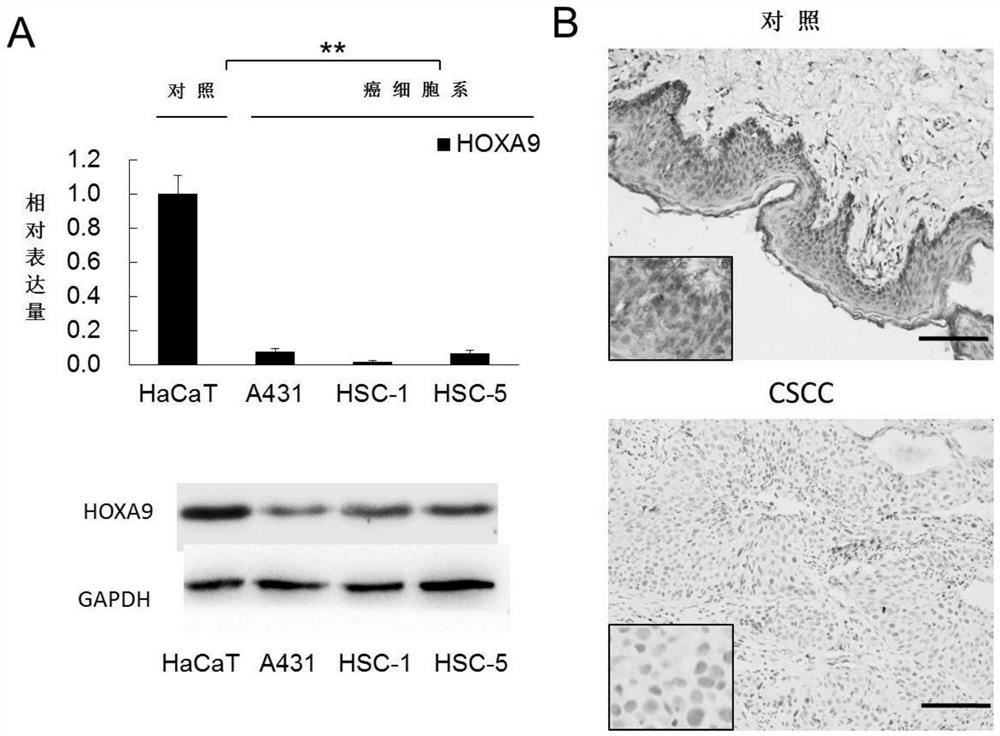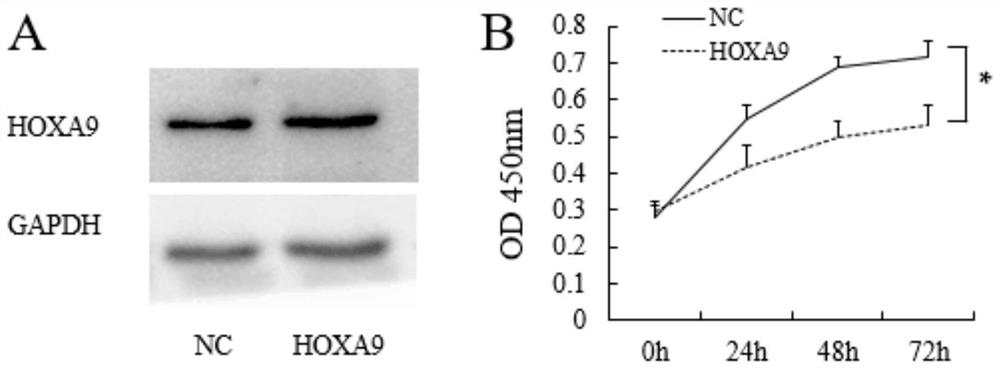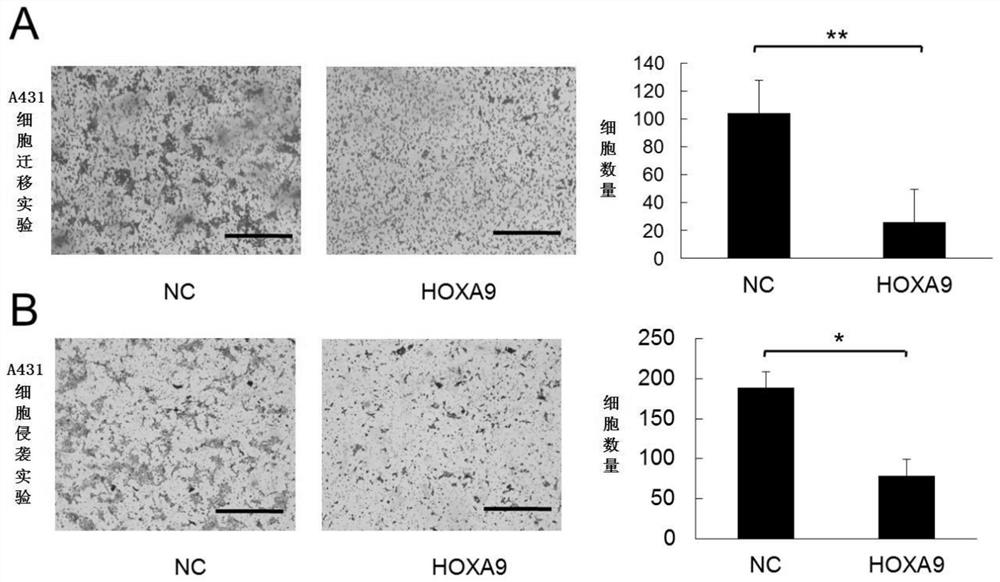Application of hoxa9 gene in preparation of medicine for treating skin squamous cell carcinoma
A squamous cell carcinoma, HOXA9 technology, applied in the field of application of HOXA9 gene in the preparation of drugs for the treatment of skin squamous cell carcinoma, can solve the problems of damaged epidermis and subcutaneous tissue, affecting the appearance of organs, and high recurrence rate
Active Publication Date: 2021-05-04
SOUTHERN MEDICAL UNIVERSITY
View PDF6 Cites 0 Cited by
- Summary
- Abstract
- Description
- Claims
- Application Information
AI Technical Summary
Problems solved by technology
In view of the fact that the operation of the traditional treatment method needs to expand the scope of resection to the surrounding tissue of the tumor, it is likely to cause damage to the function of the epidermis and subcutaneous tissue and affect the appearance of the organ. At the same time, the high recurrence rate of this method also makes it necessary to find a method that can maximize the protection of the organ. New methods of treating CSCC on the basis of intact function and beautiful appearance are imperative
Method used
the structure of the environmentally friendly knitted fabric provided by the present invention; figure 2 Flow chart of the yarn wrapping machine for environmentally friendly knitted fabrics and storage devices; image 3 Is the parameter map of the yarn covering machine
View moreImage
Smart Image Click on the blue labels to locate them in the text.
Smart ImageViewing Examples
Examples
Experimental program
Comparison scheme
Effect test
Embodiment Construction
[0032] The content of the present invention will be further described below in conjunction with specific experiments. For the experimental methods that do not indicate specific conditions in the following experiments, generally follow the conventional conditions, such as the conditions described in the "Molecular Cloning Experiment Guide" (Third Edition), or the conditions suggested by the manufacturer.
the structure of the environmentally friendly knitted fabric provided by the present invention; figure 2 Flow chart of the yarn wrapping machine for environmentally friendly knitted fabrics and storage devices; image 3 Is the parameter map of the yarn covering machine
Login to View More PUM
 Login to View More
Login to View More Abstract
The invention discloses the application of HOXA9 gene in the preparation of medicine for treating skin squamous cell carcinoma, belonging to the field of gene therapy. After two years of experimental research, the inventor and his entire team took the cell line A431, which is characteristic of skin squamous cell carcinoma, as the experimental object. Through experiments, they found that the targeted up-regulation of HOXA9 can inhibit the proliferation, migration and invasion of tumor cells, and inhibit the tumor cell proliferation. Glycolysis, ultimately improving or treating squamous cell carcinoma of the skin. The present invention provides a new method for treating CSCC on the basis of ensuring organ function intact and beautiful appearance to the greatest extent, can overcome the deficiencies of the prior art, and has great significance.
Description
technical field [0001] The invention belongs to the field of gene therapy, in particular to the application of HOXA9 gene in the preparation of medicines for treating skin squamous cell carcinoma. Background technique [0002] Cutaneous squamous cell carcinoma (CSCC) is a type of malignant tumor originating from the keratinocytes of the epidermal appendages. It is one of the most common skin malignancies in clinical practice. 20% of skin malignancies. In my country, the high incidence age of CSCC is 50-60 years old, and it is more common in exposed positions such as the head, neck, hands and forearm extension. The etiology of CSCC is complex, and long-term ultraviolet radiation is its biggest risk factor. In addition, human papillomavirus (HPV) 16, 18 and 31 infection, organ transplantation, chemical agents and other factors are closely related to its pathogenesis. Although the mortality rate of CSCC is not high, it has a strong ability to metastasize and invade, and can ...
Claims
the structure of the environmentally friendly knitted fabric provided by the present invention; figure 2 Flow chart of the yarn wrapping machine for environmentally friendly knitted fabrics and storage devices; image 3 Is the parameter map of the yarn covering machine
Login to View More Application Information
Patent Timeline
 Login to View More
Login to View More Patent Type & Authority Patents(China)
IPC IPC(8): C12Q1/6886C12N15/11G01N33/53A61K48/00A61P35/00
CPCA61K48/005C12Q1/6886C12Q2600/118C12Q2600/158G01N33/53
Inventor 丁振华周良王颖慧王鹏飞
Owner SOUTHERN MEDICAL UNIVERSITY
Features
- R&D
- Intellectual Property
- Life Sciences
- Materials
- Tech Scout
Why Patsnap Eureka
- Unparalleled Data Quality
- Higher Quality Content
- 60% Fewer Hallucinations
Social media
Patsnap Eureka Blog
Learn More Browse by: Latest US Patents, China's latest patents, Technical Efficacy Thesaurus, Application Domain, Technology Topic, Popular Technical Reports.
© 2025 PatSnap. All rights reserved.Legal|Privacy policy|Modern Slavery Act Transparency Statement|Sitemap|About US| Contact US: help@patsnap.com



